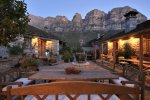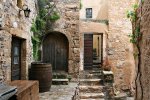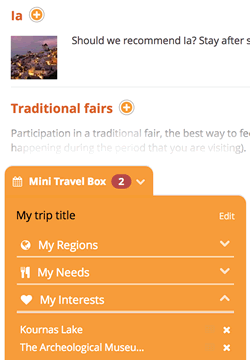The Myth of Oedipus: Just days after his birth, Laius and Jocasta, King and Queen of the city-state of Thebes, left the infant Oedipus to die of exposure on the slopes of Mount Cithaeron. The King had sought to escape the fate foretold by the Oracle at Delphi, namely that he would be killed by his own son. A shepherd found the baby and took it to the royal family of Korinth. Thus, Oedipus grew up as Prince at Tenea. Visiting the Oracle of Delphi to discover his origins, the Oracle prophecied that he would one day kill his own father and then marry his mother. Fearing this fate, Oedipus didn’t return to Korinthos but rather redirected toward Thebes. Along his way he encountered Laius, his biological father, and after a scuffle over a traffic dispute, ended up killing him. At the entrance of Thebes, Oedipus solved the Riddle of the Sphinx, which entitled him to marry the newly-widowed Queen Jocasta. As you will recall, the Queen and later, mother of his five children also happened to be his biological mother. When this was later revealed to him, he blinded himself in a fit of disgust and left Thebes to spent the rest of his life in exile.
The Myth of Titani: In Sicyon, on the banks of the river Asopos is the citadel of Titani, the first home of the Titans according to legend. There, humans and gods gathered after the end of the war between the Olympian gods and the Titans, to distribute the goods of the world. Prometheus, who liked humans, managed to fool the Gods into accepting bones offered on the altars as sacrifice. With that trick he managed to steal the fire from the gods, which he in turn delivered to the humans. For this he was punished by the gods, chained to a rock in the Caucasus, visited every day by an eagle that ate his liver. His liver would regenerate in the evening, and the eagle would eat it again the next day. So was Prometheus punished with eternal torment.
The Lion of Nemea: The Nemea region has remained famous, as there Hercules carried out one of his 12 labors. Following the orders of King Eurystheus, Hercules went to Nemea to kill the fearsome lion that had been terrorizing local residents. Discovering that the animal's nest had two entrances, he trapped the lion by blocking the one. He cracked it on the head with his club, and then strangled the stunned animal with his own hands. He skinned it and from the pelt fashioned himself a tough coat, which he wore for protection from then on.
The Wine of Flias: In the region of Nemea lived Flias, son of the god Dionysus and founder of the city Fliasia. Given as a gift from his father, according to legend, the first vineyard was cultivated in the area, and produced the wine known as ‘Fliasios Oinos’
The Birds of Stymfalia: Another Herculean Labor that took place in the district, in addition to the Lion of Nemea, is that of the ‘Stymfalides Ornithes.’ According to legend, in the homonymous lake big birds with sharp beaks and bronze claws were nesting, destroying the crops of farmers, eating their livestock and terrorizing the local residents. Hercules startled the birds with the sound of brass rattles built by the god Hephaestus, and given to him by the goddess Athena. When the startled birds took off flying, Hercules killed them with arrows dipped in the poisonous blood of the mythical monster, the Lernaia Hydra.
Hercules and Apollo: Hercules arrived at Feneos after stealing the tripod from the Delphic Oracle, because they refused to give him a prophecy. The battle that followed between Apollo and Hercules ended thanks to a thunderbolt sent by the king of gods Zeus. Apollo took the tripod back to Delphi and Hercules got the oracle he had asked for.
The Lyre of Hermes: In a cave of Mount Kyllini, the ancient nymph Maia gave birth to the god Hermes, a child from her union with Zeus, king of the gods. The first night of his life, Hermes escaped and traveled to Thessaly and managed to steal the cattle herd of his brother, Apollo. The next morning, when he had returned to Mount Kyllini, he found a turtle. From the turtle’s shell and the guts of an ox, Hermes created the first musical instrument in the world, the lyre. He offered it as a gift to the furious Apollo, who came to reclaim his herd. Eventually Apollo, spellbound by the melody of the musical instrument, took the lyre and left his herd with Hermes.
Sisyphus, Bellerophon and Pegasus: Sisyphus, a local resident, managed to outwit death twice. His punishment, for eternity, in the underworld ‘Hades’ was to endure perpetually the chore of rolling a rock to the top of a hill, (reputedly Akrocorinthos), and just before reaching the apex the rock rolling back to the bottom. Sisyphus was the one who revealed to the River God Asopos that his daughter Aegina had been kidnapped by Zeus. In exchange, Asopos created a fountain on the rocky hill of Akrocorinthos, solving the problem of water supply in the area. The grandson of Sisyphus was Bellerophon who tamed the winged horse, Pegasus. The proud Bellerophon, riding on Pegasus, tried to reach the residence of the gods on Mount Olympus, where he was punished by death.
Use the map or the alphabet below to find your favorite destination!
Achaea Prefecture
Aegina
Aetoloakarnania Prefecture
Agathonisi
Agistri
Alonissos
Amorgos
Anafi
Andros
Antiparos
Arcadia Prefecture
Argolida Prefecture
Arta Prefecture
Astypalea
Attiki Prefecture
Kalymnos
Karditsa Prefecture
Karpathos
Kasos
Kastelorizo
Kastoria Prefecture
Kavala Prefecture
Kea (Tzia)
Kefalonia
Kerkyra (Corfu)
Kilkis Prefecture
Kimolos
Korinthia Prefecture
Kos
Koufonisi (Ano & Kato)
Kozani Prefecture
Kythira - Antikythira
Kythnos
Samos
Samothrace
Santorini
Schinoussa
Serifos
Serres Prefecture
Sifnos
Sikinos
Skiathos
Skopelos
Skyros
Spetses
Symi
Syros
Would you like to combine skiing in the morning and then go swimming in the afternoon, all in one region? Click to choose your interests and see in which part of Greece you enjoy them. Combinations are endless!










